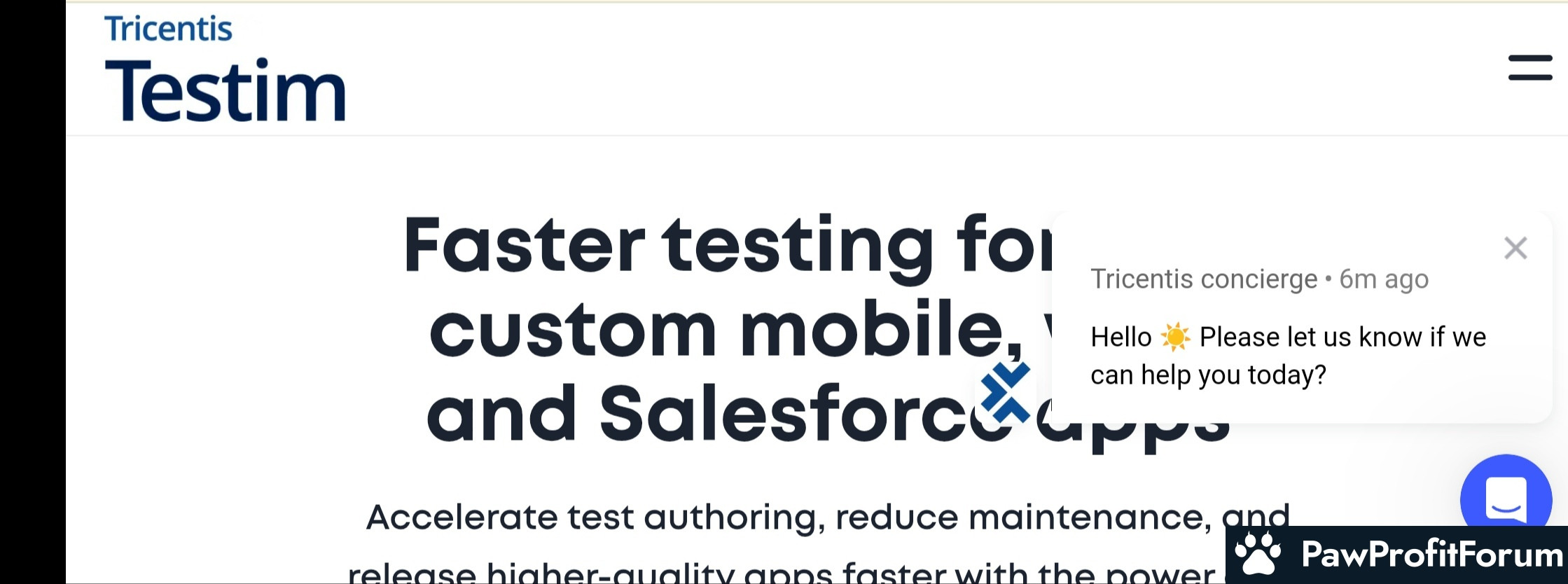**Testim.io: Accelerating Test Automation with AI-Driven Efficiency**
Testim.io has emerged as a standout platform in the crowded test automation landscape, offering a robust solution for teams aiming to streamline their QA processes. Designed for both developers and non-technical users, Testim.io leverages AI and machine learning to simplify test creation, execution, and maintenance. This review delves into its core features, usability, integrations, and value proposition for agile teams, startups, and enterprises alike.
---
### User Experience & Learning Curve
Testim.io's interface prioritizes simplicity without sacrificing depth. The platform's visual test editor allows users to create automated tests using a codeless drag-and-drop approach, making it accessible to manual testers or business analysts. For advanced users, custom JavaScript scripting enables fine-grained control over test logic. The AI-powered element locator reduces flakiness by dynamically adapting to UI changes, a common pain point in traditional automation tools.
New users can onboard quickly thanks to built-in tutorials, tooltips, and sample projects. However, mastering advanced features like parameterized tests or CI/CD integrations may require time, especially for teams transitioning from legacy frameworks like Selenium.
---
### Core Features & AI Capabilities
Testim.io's strength lies in its AI-driven test authoring and maintenance:
1. **Smart Locators**: The platform automatically identifies and stores multiple element selectors (CSS, XPath) to prevent test failures due to minor UI updates.
2. **Self-Healing Tests**: Tests adjust dynamically when elements change, reducing manual maintenance efforts by up to 70% in some use cases.
3. **Parallel Execution**: Run tests across browsers, devices, and environments simultaneously, accelerating feedback loops.
4. **Root Cause Analysis**: Detailed logs, screenshots, and video recordings help pinpoint failures quickly.
5. **Custom Scripting**: Extend tests with JavaScript for complex scenarios like API calls or database validations.
These features make Testim.io particularly valuable for applications with frequent UI updates, such as SaaS platforms or e-commerce sites.
---
### Integrations & DevOps Compatibility
Testim.io integrates seamlessly with modern DevOps ecosystems, supporting tools like Jenkins, CircleCI, GitHub Actions, and Azure DevOps. Test results can be shared directly to Slack, Jira, or email, ensuring cross-team visibility.
The platform also syncs with popular test management tools (e.g., TestRail, Zephyr) and cloud providers (AWS, BrowserStack) for scalable cross-browser testing. While native integrations cover most enterprise needs, smaller teams might find the setup process for niche tools slightly cumbersome.
---
### Pricing & Scalability
Testim.io offers a tiered subscription model:
- **Free Tier**: Includes 1 user, 500 test runs/month, and basic reporting.
- **Team Plan**: Starts at $450/month (billed annually) for 3 users, unlimited test runs, and parallel execution.
- **Enterprise**: Custom pricing with advanced security, SSO, dedicated support, and on-premise options.
While costlier than open-source alternatives, Testim.io's pricing aligns with its AI-driven efficiency gains. Startups may find the entry-tier plans restrictive, but enterprises benefit from volume discounts and tailored SLAs.
---
### Learning Resources & Community Support
Testim.io provides extensive documentation, including step-by-step guides, API references, and video tutorials. The platform's **Academy** offers free courses on test design, CI/CD integration, and best practices for scalability.
The user community, though smaller than Selenium's, is active on forums and GitHub, with regular contributions from Testim's engineering team. Enterprise customers receive priority support, including a dedicated account manager and 24/7 technical assistance.
---
### Customer Support & Documentation
Testim.io's support team is responsive, with live chat and email channels for troubleshooting. The knowledge base is well-organized, though some users note that debugging complex scripting errors could benefit from more real-world examples. Enterprise-tier support includes SLA-backed response times and personalized onboarding, which smaller teams might miss.
---
### Pros & Cons
**Pros**:
- AI-powered self-healing tests drastically reduce maintenance overhead.
- Intuitive codeless interface lowers the barrier to entry for non-developers.
- Strong DevOps integrations align with CI/CD pipelines.
- Detailed analytics and reporting enhance cross-team collaboration.
**Cons**:
- Higher cost compared to open-source frameworks like Cypress or Playwright.
- Limited mobile testing capabilities compared to competitors like Appium.
- Steeper learning curve for advanced scripting and custom workflows.
---
### Final Verdict
Testim.io is a compelling choice for teams prioritizing speed, stability, and scalability in test automation. Its AI-driven approach addresses the brittleness of traditional scripts, making it ideal for fast-paced environments with frequent UI changes, such as web applications or digital products undergoing rapid iteration. While the pricing may deter budget-conscious teams, the ROI in reduced maintenance time and improved test reliability justifies the investment for mid-to-large enterprises.
For organizations seeking a balance between codeless simplicity and advanced customization, Testim.io delivers a future-proof solution that bridges the gap between manual QA and full automation.













